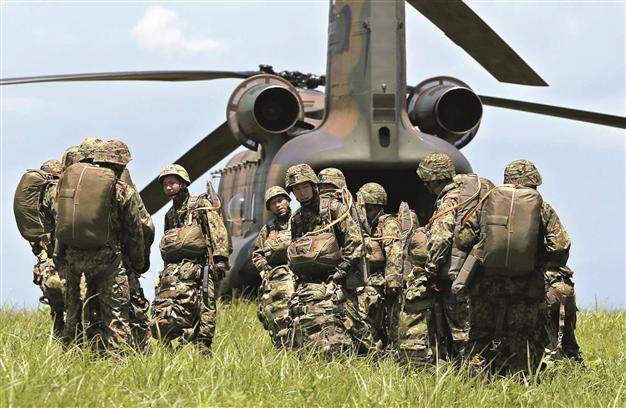Japan eyeing Marines, drones in defense paper: Reports
TOKYO

Japanese Ground Self-Defense Force’s 1st Airborne Brigade soldiers prepare to board a CH-47 helicopter for parachute drop training in Susono. Japan seeks to boosts its defense systems against possible nuclear threats from North Korea.
Japan should acquire amphibious units like the U.S. Marines and surveillance drones, according to newspaper reports, as a territorial dispute with China rumbles on.The interim report, set to be issued as early as today by the Defense Ministry, will also promote “the need to boost a comprehensive capability of containment” as part of anti-ballistic missile measures against North Korea, reports said.
The phraseology falls short of any mention of “pre-emptive strike capability,” but reflects an ongoing debate in Japan’s defense community about the need to re-interpret aspects of the pacifist country’s military stance.
Article 9 of Japan’s Constitution, drafted by U.S. occupation forces after its defeat in World War II, renounces the right to wage war and, if taken literally, rules out the very notion of a standing army. In reality, Japan’s Self-Defense Forces are one of Asia’s strongest militaries. Nationalist Prime Minister Shinzo Abe has said Japan needs to discuss the idea of having some kind of first-strike provision if it is to effectively counter threats from North Korea’s nuclear and missile programs. However, observers say he must tread carefully. Japan’s constitutionally prescribed pacifism enjoys wide support in the country at large and is particularly cherished by Abe’s coalition partners.
Asahi and Yomiuri, influential papers on the left and the right, respectively, say the interim report advocates a U.S. Marines-like amphibious force, capable of conducting landing operations on remote islands.
Harsh Chinese reaction
It also suggests looking at the introduction of a drone reconnaissance fleet that could be used to monitor Japan’s far-flung territory. “The acquisition of offensive capability would be a fundamental change in our defense policy, a kind of philosophical change,” said Marushige Michishita, a professor at the National Graduate Institute of Policy Studies. Obtaining that capability, however, would take time, money and training, meaning any shift may be more rhetorical than real. “It’s easier said than done,” Michishita added.
Still, given Japan’s strained ties with China over disputed isles and how to frame the narrative of Japan’s wartime history, China is likely to react strongly to the proposals, which come after Abe cemented his grip on power with a big win in a weekend election for Parliament’s upper house. “No matter how Japan explains things, China will attack it pretty harshly,” said Michael Green of the Washington-based Center for Strategic and International Studies.
The report will be reflected in Japan’s long-term defense outline that is expected to be published toward the end of this year, a ministry spokesman said, adding that a committee comprising top defense officials had been engaged in discussion on the subjects for several months.
















